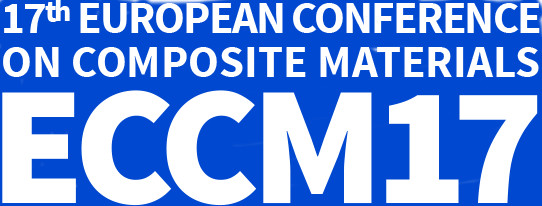

App-Einstellungen:
EFFECT OF THE SAMPLE GRANULOMETRY ON THE HYDROLYSIS OF CARBON FIBRE REINFORCED EPOXY (CFRE) IN HIGH TEMPERATURE AND HIGH PRESSURE WATER
Gidéon Simenou Jambong (Laboratoire de Thermocinétique de Nantes) Eric Le Gal La Salle (ICAM Nantes) Jean-Luc Bailleul (Laboratoire de Thermocinétique de Nantes) Jérôme Bellettre (Laboratoire de Thermocinétique de Nantes)
This investigation was undertaken in order to collect information about the effect of the granulometry on the degradation of the resin, during the high temperature and high pressure hydrolysis of CFRE.
EFFECTS OF AUTOMATED PATCH PLACEMENT ON THE MECHANICAL PERFORMANCE OF REFORMED NCF CARBON FIBRE
Jamie Snudden (University of Bristol) Bernhard Horn (Technical University of Munich) Carwyn Ward (University of Bristol) Kevin Potter (University of Bristol) Klaus Drechsler (Technical University of Munich / Institute for Carbon Composites)
A novel approach to reforming in-process scrap into an aligned material with a grid of discontinuities using the Fibre Patch Placement Process which had been modified. The reformed material was tested in flexure showing a low drop in performance.
EXPLORING THE FLEXURAL AND ADHESION BEHAVIOR OF COMPOSITE SANDWICH PANELS MADE OF RECYCLED FOAMED POLYPROPYLENE CORE AND GLASS/PP SKINS
Mohammadreza Azad (Concordia University) Mehdi Hojjati (Concordia University) Hossein Borazghi (AS Composite)
The effect of using a solid-surface polymer foam as the core material on the mechanical and physical properties of composite sandwich panels was investigated and results were compared with a typical PP honeycomb sandwich panel with the same thickness.
INVESTIGATION OF THE EFFECT OF HOT WATER AND WATER VAPOUR TREATMENTS ON THE STRENGTH OF THERMALLY CONDITIONED E-GLASS FIBRES
Peter Jenkins (University of Strathclyde) Mhari Stafford (University of Strathclyde) James Thomason (University of Strathclyde)
An investigation of possible strength recovery methods using hot water or water vapour was carried out on E-glass fibres. A strength increase of previously thermally conditioned fibres of up to 130 % was achieved.
KINETIC OF THE HYDROLYSIS OF THREE DIFFERENT CARBON FIBRE REINFORCED EPOXY (CFRE) IN HIGH TEMPERATURE AND HIGH PRESSURE WATER
Gidéon Simenou Jambong (Laboratoire de Thermocinétique de Nantes) Eric Le Gal La Salle (ICAM Nantes) Jean-Luc Bailleul (Laboratoire de Thermocinétique de Nantes) Jérôme Bellettre (Laboratoire de Thermocinétique de Nantes)
In this work, the kinetics of the resin degradation during the hydrolysis of three different CFRE were investigated. A kinetic model found in the literature was used to determine the global kinetics parameters.
MECHANICAL RECYCLING OF CONTINUOUS FIBRE REINFORCED THERMOPLASTIC COMPOSITES USING COMPRESSION MOULDING
Julien Moothoo (Université Orléans) Pierre Ouagne (ENI Tarbes/ Université Orléans)
Production scrap of continuous fibre reinforced laminates were cut into aggregates and processed in bulk form using compression moulding. The tensile properties of the recycled panels were characterised to assess this recycling technique.
QUANTIFYING VARIABILITY OF RECYCLED FIBRES IN COMPOSITES USING MULTILEVEL MONTE CARLO
Timothy Dodwell (University of Exeter) Ken Evans (University of Exeter) Oana Ghita (University of Exeter) Anhadjeet Sandhu (University of Exeter) Luke Savage (University of Exeter)
The paper presents a novel sequence of computational methodologies to efficiently quantify the variability in mechanical properties of composites remanufactured from recycled/recovered fibres.
RECOVER: REGENERATING THE STRENGTH AND VALUE OF THERMALLY RECYCLED GLASS FIBRES.
James Thomason (University of Strathclyde) Liu Yang (University of Strathclyde) Eduardo Saez (University of Strathclyde) Ulf Nagel (University of Strathclyde)
Thermal recycling of end-of-life glass fibre composites or production waste gives fibres with no strength or value. ReCoVeR treatment of recycled fibres restores their strength and ability to act as effective reinforcement in second-life composites.
RECYCLING OF CARBON FIBERS FROM CARBON FIBER REINFORCED THERMOSET POLYMERS BY USE OF SUB- AND SUPERCRITICAL FLUIDS
Anna Schneller (University of Augsburg) Lucile Henry (Institut de Chimie de la Matière Condensée de Bordeaux CNRS ) Janosch Doerfler (University of Augsburg) W.M. Mueller (University of Augsburg) Cyril Aymonier (Institut de Chimie de la Matière Condensée de Bordeaux CNRS ) Siegfried Horn (University of Augsburg)
A fiber-matrix separation step is investigated since it has major impact on the properties and the processability of the recycled CF. The process is based on the solvolysis of a thermoset resin by two different sub- and supercritical fluids.
RECYCLING OF PHENOLIC MOLDING COMPOUNDS AS FILLER IN PARTICULATE COMPOSITES
Fabien Bernardeau (Ecole des Mines d'Alès) Didier Perrin (Ecole des Mines d'Alès) Anne-Sophie Caro (Ecole des Mines d'Alès) Jean-Charles Benezet (Ecole des Mines d'Alès) Patrick Ienny (Ecole des Mines d'Alès)
A recycling method for thermoset material is proposed in this work, consisting in using it as a filler in a plastic. The effect of particle size distribution and coupling agent on mechanical properties are studied, as well as damaging mechanism.
